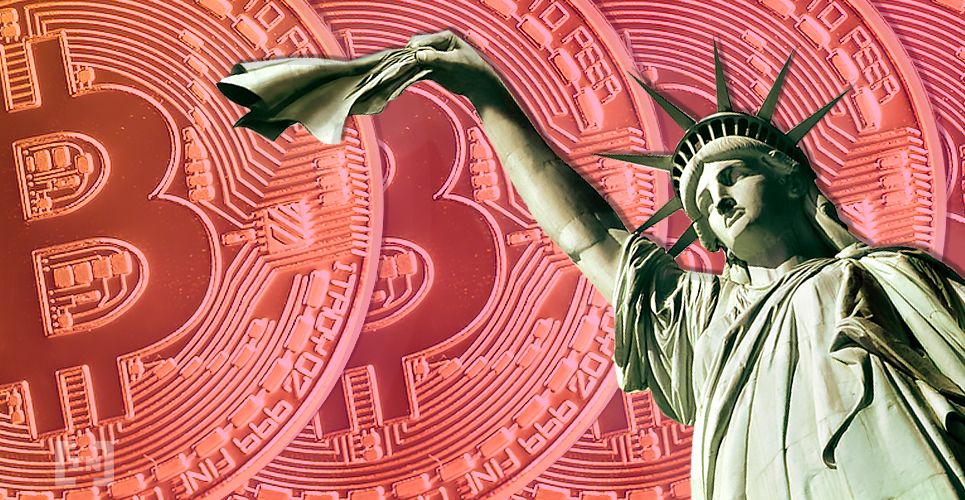For hundreds of years, the gold standard was an established staple for most world economies.
The Bretton Woods Act of 1944 established the United States Dollar (USD) as an international reserve asset pegged to the gold price. The USD held that status until 1971 when US President Nixon dissolved the gold standard. Despite the collapse of Bretton Woods and the gold standard, the US dollar remains a premier reserve currency to this day — both in the International Monetary Fund (IMF) and Foreign Exchange Reserves.
However, this may be changing. Based on a Nov 30, 2018, tweet from economist and cryptocurrency investment strategist Tuur Demeester, Bitcoin may be well on its way to becoming a viable reserve asset.
Let’s take a moment to review his basic argument.Why I think Bitcoin is evolving towards Reserve Asset status:
— Tuur Demeester (@TuurDemeester) November 30, 2018
📈 10yr track record
📈 Highest security
📈 Stable & growing protocol stack
📈 Institutional adoption
📈 High & improving privacy
📈 Politically neutral
📈 User sovereignty
📈 Virtuous liquidity cycle
10-Year Track Record
Looking at the entirety of recorded history, ten years is not a lot of time. However, in light of the current pace of technology and its projected future growth, ten years is basically an eternity. Most of the technology used today for normal activities of daily living will be obsolete in three to five years. In some cases, that timeline will be even shorter. Any parent can attest to this reality — most of what the average ten-year-old uses every single day did not exist ten years ago. The fact that Bitcoin has survived an entire decade is somewhat of a testament in and of itself to its potential as a reserve asset.
Highest Security
It would be false to say that Bitcoin is highly secure. However, of its numerous security breaches over the past few years, none have been a direct attack on its SHA-256 Proof-of-Work (PoW) transaction verification protocol. Rather, they have been attacks on storage and exchange methodologies, an entirely separate function from the blockchain itself. In its fundamentals, Bitcoin is at least as secure as the USD.A Stable & Growing Protocol Stack
This point is potentially a tough sell for anyone who isn’t already an avid blockchain enthusiast — but Bitcoin’s protocol stack is undeniably growing. The creation of lightning networks, side chain protocols, and others, has led to greater levels of functionality and adoption.
Institutional Adoption
This is no small feat. As recently as two years ago, traditional financial institutions would not touch cryptocurrency. However, powerhouses like Morgan Stanley, Fidelity, and Bank of America accepting cryptocurrency as a legitimate investment platform has legitimized Bitcoin in the eyes of a new wave of previously disinterested high-level financial entities.High & Improving Privacy
One of Bitcoin’s founding principles was privacy. And it has succeeded, in that Bitcoin addresses are completely anonymous. (But not really.) For example, addresses are visible during a transaction. New features such as the Bitcoin Confidential Transaction (CT) tool and its Bulletproof protocol seek to move beyond anonymous addresses, privatizing the entire process. A long-established pain point for Bitcoin, new technology is constantly in development to better mitigate issues such as these.
Politically Neutral
At any time, anyone can access the entire Bitcoin source code. This means that Bitcoin is open-source, uncontrolled, and uncontrollable by any one specific entity. It is also safe to say with reasonable certainty that Bitcoin is free from outside influence, more so than the average reserve asset, which is typically directly pegged to a single government. Removal of centralized government means that Bitcoin can function freely with the market — a true laissez-faire asset.
User Sovereignty
Again, most reserve assets (with the exception of gold) are tied to a governmental body. This means that the potential collapse of that government would mean a complete and catastrophic collapse of assets for individual holders. Because Bitcoin is decentralized and held by individuals, any financial crisis at the level of centralization is rendered inapplicable, making it a solid reserve asset option.Virtuous Liquidity Cycle
For investors unfamiliar with this term, a virtuous liquidity cycle is finance’s version of a positive feedback loop. More investors buying Bitcoin leads to greater liquidity and adoption, which leads to even more investors buying Bitcoin. This both increases and legitimizes its value, making it a stronger and stronger candidate for reserve asset status. This convincing argument for Bitcoin as a reserve asset is a new perspective for sure. But given that Bitcoin, still a relative newcomer to the financial scene is already exhibiting this strength and potential, it is an argument worth considering. Do you agree or disagree with Tuur? Leave your thoughts in the comments below!
Top crypto platforms in the US
Disclaimer
In adherence to the Trust Project guidelines, BeInCrypto is committed to unbiased, transparent reporting. This news article aims to provide accurate, timely information. However, readers are advised to verify facts independently and consult with a professional before making any decisions based on this content. Please note that our Terms and Conditions, Privacy Policy, and Disclaimers have been updated.

Jon Buck
With a background in science and writing, Jon's cryptophile days started in 2011 when he first heard about Bitcoin. Since then he's been learning, investing, and writing about cryptocurrencies and blockchain technology for some of the biggest publications and ICOs in the industry. After a brief stint in India, he and his family live in southern CA.
With a background in science and writing, Jon's cryptophile days started in 2011 when he first heard about Bitcoin. Since then he's been learning, investing, and writing about cryptocurrencies and blockchain technology for some of the biggest publications and ICOs in the industry. After a brief stint in India, he and his family live in southern CA.
READ FULL BIO
Sponsored
Sponsored
